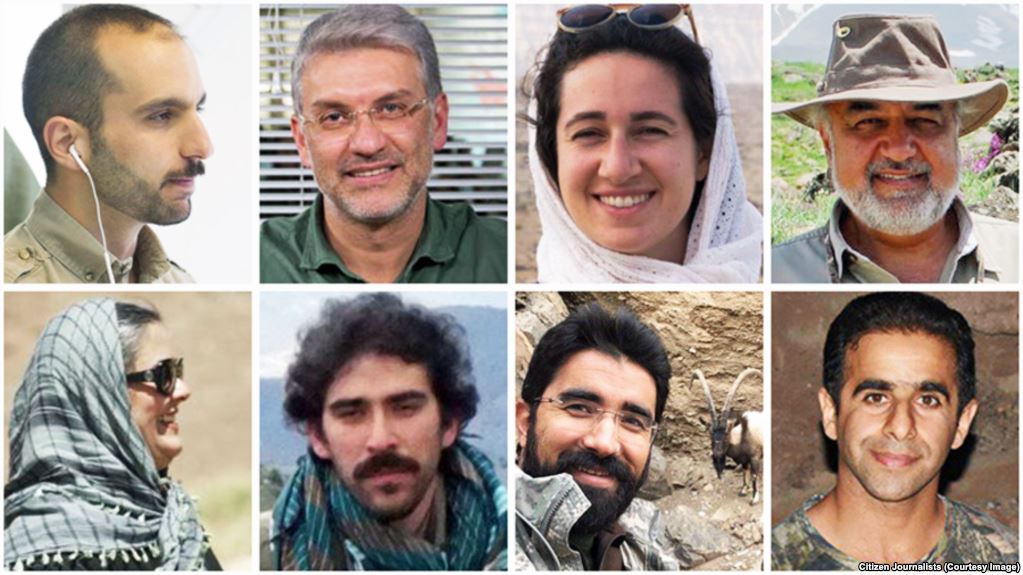Desperate Families Call on Iranian State Heads to Release Detained Environmentalists
 |
| Detainees Held For Six Months Without Access to Counsel |
AUGUST 3, 2018
The families of
environmentalists who have been detained in Iran for the past six months—many
in solitary confinement and without counsel—have sent a letter to the three
heads of state advocating for the detainees’ release.
“It has been six months since
the arrests of our loved ones who are known as some of the best and most
respected environmentalists in Iran. These six months have been full of
hardship, apprehension and anxiety for them and us. Six months without the
liberty to make phone calls or have visitations. In these six months, tens of
environmentalists have been detained and eight of them are still without access
to lawyers in Ward 2-A of the Islamic Revolutionary Guard Corps’ Intelligence
Organization in Evin Prison in small cells with a few other inmates.”
The letter addressed President
Hassan Rouhani, Parliament Speaker Ali Larijani, and Judiciary Chief Sadegh
Larijani and was published in full by the state-run Islamic Republic News Agency (IRNA)
on July 31, 2018, “The families and relatives of
the detained environmentalists urge the respected heads of branches of state to
use their high authority in matters of national security and crisis management
to devise a wise plan to free these young patriots and rid them of false and
painful accusations of espionage,” added the letter.
Dozens of environmentalists
have been arrested throughout Iran since January 2018 by the IRGC.
According to the opposition news site Kalame, the environmentalists were targeted by the IRGC for opposing the
installation of missile sites on protected lands.
Iranian Canadian academic and
environmentalist Kavous
Seyed-Emami died under suspicious circumstances in
Iran’s Evin Prison in February 2018 after being arrested by the IRGC the
previous month. Several of his colleagues at the Tehran-based Persian Heritage Wildlife Foundation(PHWF), where Seyed-Emami worked as managing director, remain
detained since being arrested in January.
The families noted in their
letter that the detentions were continuing even though “the president’s special
fact-finding committee, the intelligence
minister and the head of the Department
of Environment have officially declared that the
accusations of espionage against the detainees are incorrect and called for
their freedom.”
The families who signed the
letter are related to the first group of environmentalists who were arrested in
January 2018 along with the now-deceased Seyed-Emami—all current and former
staff members of PHWF.
The PHWF detainees include Sam
Rajabi, Niloufar Bayani, Morad Tahbaz (also holds
American citizenship), Amir Hossein Khaleghi, Taher Ghadirian, Houman Jowkar,
Sepideh Kashani and Abdolreza Kouhpayeh.
Dozens of other environmentalists
have also been arrested in other parts of the country including the southern Iranian
harbor city of Bandar Lengeh and surrounding towns Lavaredin, Janah and Bastak
in Hormozgan
Province.
In May 2018, the head of the
Department of Environment, vice president Isa Kalantari, rejectedaccusations that the environmentalists were spies by referencing
the Intelligence Ministry’s conclusions.
“It has been determined that
these individuals were detained without doing anything,” Kalantari said. “The Intelligence Ministry has concluded that there is no
evidence that these individuals were spies.”
“The government’s fact-finding
committee has concluded that the detained activists should be released because
there’s no evidence to prove the accusations leveled against these
individuals,” he added.
The Kalame website reported that the environmentalists were accused of being spies
because they had spoken out against the IRGCs’ plans to develop missile sites
on environmentally sensitive land.
“Kalame has received
information that the environmental activists are not spies but in fact had
resisted the IRGC’s excessive demands to encroach on environmentally protected
regions for the installation of missile sites,” the opposition news site
reported on April 16.
The report continued: “Although
these regions were registered in the United Nations as protected areas, the
IRGC thought it could build military sites there without any problem, thus it
went ahead with installing missile silos and equipment. The move met opposition
from environmental groups that repeatedly asked the IRGC to evacuate. The
groups made it clear that the IRGC was endangering their activities to collect
information and take photos of animals and plants for the UN. But the IRGC did
not agree and asked these groups to instead submit old photos in their annual
reports to the UN. The conflict between the two sides went on for years and
eventually the IRGC’s Intelligence Organization used espionage as an excuse to
arrest the environmentalists so that it could continue its activities in the
protected regions without any problem.”
No comments:
Post a Comment